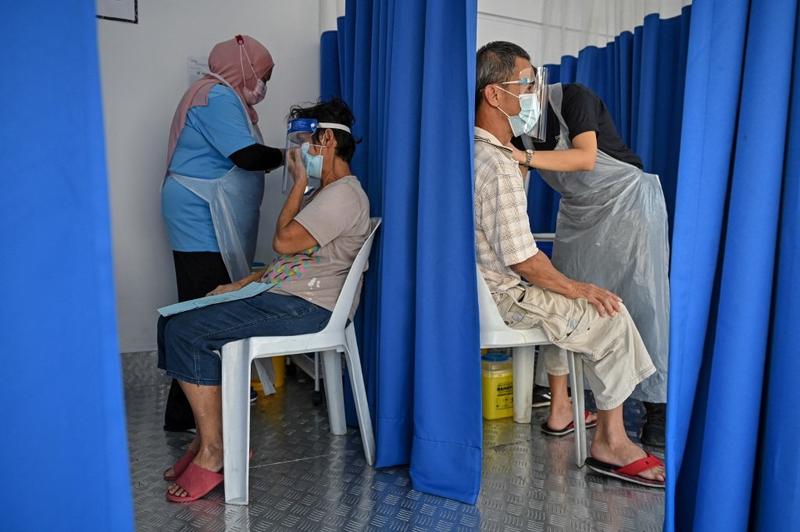 People receive the Sinovac Covid-19 coronavirus vaccine on a mobile vaccine truck in Kuala Lumpur on June 21, 2021. (MOHD RASFAN / AFP)
People receive the Sinovac Covid-19 coronavirus vaccine on a mobile vaccine truck in Kuala Lumpur on June 21, 2021. (MOHD RASFAN / AFP)
The worsening pandemic in Malaysia has added to the concerns of the government following the current king's call to reconvene the parliament despite emergency suspensions, analysts said.
Malaysia launched its vaccination program in February and aims to inoculate over 80 percent of its population of 33 million within the year
Parliament and state legislatures were suspended since January 11 after Prime Minister Muhyiddin Yassin's announcement that Malaysia was to be placed under a state of emergency to curb the COVID-19 outbreak. Al-Sultan Abdullah Ri'ayatuddin Al-Mustafa Billah Shah, king of Malaysia, had consented to Muhyiddin's proposal to declare a state of emergency until August 1.
But on June 16, Sultan Abdullah said parliament should meet "as soon as possible", noting that this is "an important platform for elected representatives to discuss various issues relating to the COVID-19 pandemic". The king also called for the acceleration of the national immunization program.
Analysts said the king's statement reflects the public sentiment on the government's failure to contain the pandemic. Despite the imposition of a state of emergency, COVID-19 cases continued to climb with a total number of infections exceeding 701,000 as of June 22.
ALSO READ: M'sia: 7,200 Indonesian workers without papers to be deported
The statement was issued after leading a special session of the Conference of Rulers – comprised of the nine state monarchs of Malaysia. Prior to the meeting, Sultan Abdullah had also met with other political leaders, including those in the ruling Perikatan Nasional coalition and the opposition, to discuss the pandemic and the country's economy.
Oh Ei Sun, senior fellow at the Singapore Institute of International Affairs, said this statement has shown that Sultan Abdullah is "playing a more proactive role in politics", adding the general public welcome this move.
The Southeast Asian country has a constitutional monarchy, with the king usually performing ceremonial roles while an elected prime minister and his cabinet takes charge of the government. Nine state monarchs rotate five-year terms as Malaysia's Yang di-Pertuan Agong, or paramount ruler.
But the pandemic combined with the lockdowns that dragged down the economy have sparked public discontent. This has pushed Sultan Abdullah to step in and wield a stronger influence in the country's politics.
James Chin, professor of Asian Studies at the University of Tasmania in Australia, said Sultan Abdullah's call is "more of a suggestion, not an order". But this suggestion, he said, reflects a "popular message from the people". Chin cited Malaysians' frustrations not only with the rising number of infections but with the slow vaccine rollout.
Malaysia launched its vaccination program in February and aims to inoculate over 80 percent of its population of 33 million within the year. But as of June 20, only 4.2 million people have been vaccinated, according to data issued by the Special Committee for Ensuring Access to COVID-19 Vaccine Supply. The committee is co-chaired by the Ministry of Health of Malaysia and the Ministry of Science, Technology and Innovation.
In a press briefing held on June 20, Muhyiddin said he has formed a committee comprising administration and opposition lawmakers to look into key issues before parliament can reconvene. These issues include whether all 220 members of parliament need to be physically present during the legislative meeting or if a "hybrid" of physical and virtual sessions can be used instead.
Awang Azman Awang Pawi, associate professor at the Academy of Malay Studies at the University of Malaya in Kuala Lumpur, said that while Sultan Abdullah cannot compel Muhyiddin to reconvene the parliament, it will be difficult “to ignore it as it comes from the king and other Malay rulers".
Awang Azman alluded to how Malaysians revere the monarch and ignoring the call to reconvene the parliament will be considered a "mark of disrespect" to the king.
However, due to criticisms levied against the government and the ruling PN coalition, allowing legislative sessions might lead to a motion of no-confidence vote. This threatens Muhyiddin's hold on power as PN only has a razor-thin majority in the parliament.
Oh of the Singapore Institute of International Affairs said that as a parliamentary democracy, Muhyiddin and PN could have used their "parliamentary advantage" to block any no-confidence motion.
"If the parliament is in session, members of the parliament can ask questions," Oh said.
ALSO READ: Malaysia gets Deloitte's U$80m 1MDB settlement payout
Chin of the University of Tasmania said infighting in the ruling PN also means that while there are some members who do not want to ignore the king's call, there are others who prefer to delay reopening of the parliament to fend off threats from the opposition.
The United Malays National Organization, one of the parties behind PN, has issued a statement on June 21 "urging the government to respect the decree of the king and the rulers and reconvene parliament in the next 14 days". UMNO President Ahmad Zahid Hamidi said failure to do so would be considered as a form of "disrespect" to the Conference of Rulers.
Malaysia reported 4,743 new confirmed COVID-19 cases on June 23, down from a peak of 9,030 on May 30, according to data from the World Health Organization. The total registered infections rose to 705,762 cases with 4,554 deaths.


